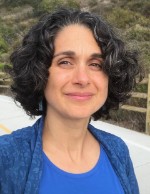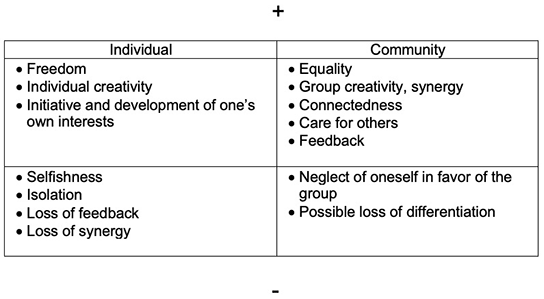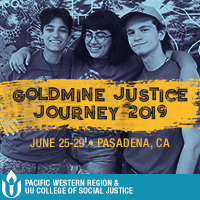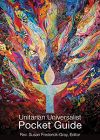Shifting Our Paradigm with Children and Families I discovered something
startling recently: since a peak in 2002, the number of children and youth in our congregations has sharply declined. Quite a bit in fact: it’s just 60% of what it was. By contrast, our adult numbers are 98% of what they were. This explains something: since I started working with the Pacific Western Region three years ago, I’ve gotten countless calls and emails from congregations saying "we’re not attracting young families" or "our religious education program isn’t working." Congregations tend to locate the source of the problem inside the congregation: "the board and minister aren’t supportive enough of youth!" "The religious educator has gotten complacent!" "The parents are so unreliable!" But in truth, it’s not that simple. It’s about much more.
The trends affecting children and family participation in Unitarian Universalist religious education are broad, culture-wide trends. They are much bigger than who’s in the pulpit or the religious educator’s office, much bigger than your congregation’s financial support of Religious Education (RE). Some congregations have managed to maintain stable (or even increased) participation of children and youth, but they are the exceptions. They’ve had to innovate to address society’s changes, including:
- the sharp increase in the percentage of Americans who do not identify with any religion and are unfamiliar with what a religious institution could offer them;
- "time poverty," with families feeling stretched, stressed, overwhelmed, and overscheduled;
- highly public cases of clergy abuse that decrease trust in the safety of all religious institutions;
- as well as Sunday morning sports and birthday parties, shared custody, and other factors that keep children’s participation inconsistent.
I’ve gotten more and more of a sense over the years that
increasing the participation of families and children is not a technical problem to solve. It’s an adaptive challenge.
What do we do when we are facing an adaptive challenge? We do our best to open our hearts, open our minds, and allow our perceptions to be reshaped. To shift into a new paradigm, we let our very assumptions change: like seeing the profiles of two faces, where before we saw only a vase.
Resourcing that paradigm shift is something I’m working on at the UUA. Your PWR team is now prepared to lead congregations in Faith Formation Visioning work to help make that shift. The new Faith Formation section of UUA.org/pwr also showcases some models that are emerging from congregations making the shift.
As we shift, some assumptions about the way children and families find us and "do church" need to go out the window. Whatever ways of being our congregations embody in the future must be grounded in the real lives and real needs of the families of today (and tomorrow). Because when we get right down to it, our congregations are not here on this earth to support Sunday school programs. They’re not even here on this earth to support worship services. Our congregations are here to support the spiritual transformation of a multifaceted, multicultural people of all ages, partners on a journey of integrity, justice, interconnection, and joy. Religious educators and ministers have incredible wisdom to offer on that journey, even if how they do things changes quite a bit
along the way. Whatever means we will have to achieve the end of transformation: that is ours to shape together. I can’t wait to see what emerges.
Warmly,
Rev. Sarah Gibb Millspaugh
Pacific Western Region Congregational Life Staff
|
|---|
|
May 9, 2019In this Issue- Shifting Our Paradigm
- PWR & UUA News
- District Updates
- Healthy Congregations
- Youth News
PWR Quick Links
PWR Field Staff
|
|---|
|
|---|
Stories for UU CollectionJoanne Dingus, Director of Religious Education, Newport News, VA, and Twinks Hastings, Children and Youth Ministries Director, Brewster, MA, are compiling stories of UUs who make small differences every day. They envision the collection being used in several ways: church committees may choose to read a story as inspiration at the beginning of a meeting; Religious Educators may find stories that would work for A Time for All Ages; congregants might read
a story each day as a spiritual practice. If you are interested in sharing a story with them for their collection, "The Every Day UU: Now and Then," please contact storiesforUU@gmail.com. Submissions should be between 300-500 words and submitted as a Word document. Include details about the person and when and where the story took place. The deadline for receipt is June 30.
Upcoming OWL TrainingsOWL Grades K-1 & 4-6
OWL Grades 7-9 & 10-12
PWR Job PostingsJob openings in PWR congregations are now included on the UUA Jobs Board. Don't worry — even though the URL says "ministrysearch", you'll find all positions posted here. If your congregation has an opening you’d like listed, please complete the online submission form and we'll get it posted for you.
| |
|---|
|
|---|
Mountain Desert District Annual MeetingThe Mountain Desert District will be holding their 2019 Annual Meeting in conjunction with the UUA General Assembly in Spokane, WA. The meeting will convene Wednesday, June 19 at 3:30 in room 300-C of the Spokane Convention Center. Delegates will check in by 3:15 to be issued voting credentials. As meeting materials become available, they are posted to the MDD annual meeting website. A PDF of the compiled meeting materials will be distributed to MDD congregations and MDD GA
registrants by the week of June 10. We will also link this packet on the MDD annual meeting website.
Please note that becoming a delegate for General Assembly and becoming a delegate for your district annual meeting are two separate processes. In order to serve as a delegate to the district annual meeting, your minister, president, or their designee needs to certify your congregation’s delegates using this MDD Delegate Certification Form.
MDD Chalice Lighters Spring Call - San Juan UU FellowshipThe spring 2018/19 Chalice Lighters call is to assist the San Juan Unitarian Universalist Fellowship in Farmington, NM with a building project.
The Church Board President writes,
"We have bats in our belfry (attic). We discovered the problem when we found a dead bat in the sanctuary. Bats are protected in New Mexico, and we could do nothing until the winter when they left and flew to a warmer climate.
"The estimate for sealing the building and removing the guano is approximately $6,500 to $7,000. We have been in contact with a contractor to seal the building but removing the guano takes specialized suits and equipment.
"We are working to grow the congregation, in many ways. Having a building that is safe and clean will help with that effort."
You can read the full letter and donate online at our new Giving Page, which should be available in the next few days.
Contributions to the San Juan UU Fellowship call will be accepted through June 27.
If you have questions, please write to MDDChalicelighters@pwruua.org.
| |
|---|
|
|---|
Pacific Central District's Annual MeetingPlease make sure that your congregational delegates are registered and certified by Friday, May 10 at 5PM Pacific Time for the PCD online business meeting. Links to register and to certify are also available on the PCD annual meeting page. A PDF of the compiled meeting packet will be shared with registrants and PCD congregations, and posted on the
PCD annual meeting page.
Before the meeting begins at 2PM PT, Saturday, May 11, a Zoom link to participate in the meeting will go out by email to all who have registered. Non-delegates are welcome to register! The meeting link will also be posted on the PCD annual meeting page.
A conversation on ministry with and for youth, and the Chalice Lighters program are two important initiatives taking place on a district scale. Vote in a new board, adopt a new budget, and come learn more about what is happening among us.
Some of you may be planning to connect to Zoom as a group. Tallying votes would be simpler and faster if each delegate could connect individually using a separate device, whether a computer or a smartphone, even if you are gathered in one physical space. If it isn’t possible to connect with one device per delegate, there will still be ways to tally your vote accurately. We’ll just have to be more patient and creative.
Looking forward to seeing many of you online this weekend!
Pacific Central District Nominations SoughtAs the Pacific Central District board prepares to reimagine what structure works best for our future, the district Nominating Committee is looking for several people to lead the district.
Do you have experience that would help find a new way forward for the district? A vision for how congregations can collaborate and support each other? Skills to navigate institutional change? A commitment to infuse anti-oppressive and liberating UU values into our institutional culture? Do you know somebody who does?
We will be looking for board members and Nominating Committee members to serve two-year terms that begin this summer.
Join us for the important journey of plotting our future. Contact pcdnominating@pwruua.org for more information or to apply for a position.
| |
|---|
|
|---|
Pacific Northwest District Annual MeetingThe Pacific Northwest District will be holding their 2019 Annual Meeting in conjunction with the UUA General Assembly in Spokane, WA. The meeting will convene Wednesday, June 19 at 3:30 in room 300-B of the Spokane Convention Center. Delegates will check in by 3:15 to be issued voting credentials. As meeting materials become available, they are posted to the PNWD annual meeting website. A PDF of the compiled meeting materials will be distributed to PNWD congregations and PNWD GA
registrants by the week of June 10. We will also link the packet on the PNWD annual meeting website.
Please note that becoming a delegate for General Assembly and becoming a delegate for your district annual meeting are two separate processes. In order to serve as a delegate to the district annual meeting, your minister, president, or their designee needs to certify your congregation’s delegates using this PNWD Delegate Certification Form.
PNWD Spring Chalice Lighter Call - Growth Technology InitiativesSince the PNWD Chalice Lighters program inception in 1990, you have provided over $800,000 to help our congregations grow! This is pay-it-forward generosity, at its best.
This is our Spring 2019 Call: Fund Growth Technology Initiative Grants.
Please help your fellow congregations communicate more effectively, inclusively, and vibrantly! Previous calls devoted to Tech Grants led to 19 grants of up to $4,000 in 2013, 2015, and 2017, and revealed that significant unmet need remains, particularly for slightly larger grants. Tech grants have funded microphones, speakers, web conferencing equipment, video screens, projectors, assisted listening devices, and more. Grants of up to $4,000 will be funded by this call. If your congregation is interested in applying for a Tech Grant, the application form is available in Microsoft Word or Adobe PDF.
Respond now with your gift of $20 or more.
We are grateful for whatever you can contribute. Payments will be accepted towards this call through June 27. Your gift will turn into action before the end of the summer. Make your payment online, on our donation page.
Send your questions and updates on how you want to receive future notices to: pnwdchalicelighters@pwruua.org.
Thank you for your generosity!
| |
|---|
|
|---|
Turning the Tides - Intergenerational Leadership Summit and CampSave the date - August 4-8 at Camp de Benneville Pines
Justice-seeking UUs of all ages are invited to register for this multi-day summit on the mountaintop. Adults and families will gather for restoration and imagination with Unitarian Universalists and kindred spirits from across the region.
Visit http://uujmca.org/training-education/turning-the-tides to learn more. Registration is opening soon!
| |
|---|
|
|---|
Competing Values? Try Managing PolaritiesBy Bill Pryor, PWR Healthy Congregations Team
Jan Gartner, UUA Compensation and Staffing Practices Manager, describes a polarity as "an interdependent pair of needs, values, or goals. Although the two ‘poles’ may be in tension with each other, both are good and true and they depend on each other over time."
Think of polarities as equally positive values at opposite ends of the same spectrum. Each value has its own strengths and weaknesses. On the spectrum from individualism to community, for example, emphasis on the individual enhances freedom, stimulates creativity, encourages initiative and development of one’s own interests. Carried to excess it leads to selfishness, isolation, and loss of community creativity, feedback, and synergy. Similarly, emphasis on community can provide equality, connectedness, group creativity and feedback, and care for others. In excess it can stifle individual freedom and creativity, discourage initiative, and lead to neglect of oneself in favor of the group.
 Polarities can come in many flavors: humanism and theism; meditation and conversation; freedom and control; quality and efficiency; candor and diplomacy; stability and change; and so forth.
Polarities manage themselves, for the most part. There is a natural flow back and forth as conditions change and people come and go. As things become uncomfortable or dysfunctional towards one end of the spectrum, some members will begin to pull towards the other pole—in the literature these folks are called Crusaders. Opposing them are those who resist change—they are called Tradition Bearers.
Polarities mostly are self-balancing; there is an ebb and flow, with emphases shifting to meet changing interests or circumstances. Sometimes, however, things get stuck. Tradition Bearers hang on to things, to the frustration of Crusaders, and Crusaders threaten the comfort level of Tradition Bearers. Group effectiveness falters.
The approach to managing a stuck polarity is first to recognize it as such. This requires listening carefully to all involved voices. Once it appears that there are competing values involved, develop identifying labels for the two poles, in terms that are as neutral as possible, so as to avoid unnecessary prejudice. For example, Generosity vs. Greed will not work quite as well as Sharing vs. Preserving. Ask people to identify the strengths and weaknesses of each pole—make a diagram to facilitate this. Draw a horizontal line on a piece of paper and cross it with a vertical line, creating four quadrants. Enter the names of the poles on opposite sides of the figure. Involve the group in listing the positive attributes of each pole in the two top quadrants and the negative
attributes in the bottom two quadrants. Decide where the group is stuck with respect to location in the quadrant. This will facilitate a discussion on how to proceed. Validate each person’s concerns. Identify what might be gained and what might be lost, what is hoped and what is feared. This process might well create movement that will resolve the dilemma.
For further information, two books and two videos:
Author Bill Pryor has been involved in Healthy Congregations work since 2000, first in the Pacific Central District of the UUA, and in the Pacific Northwest District since 2017. He has participated in numerous trainings and conflict interventions. Bill is a member of First Unitarian in Portland, where he lives. He is impressed by the quality of ministry and the music program there, and by their unyielding efforts to foster justice in all forms.
| |
|---|
|
|---|
Registration for Thrive Youth is open!July 17-21 in Minneapolis, MN. Thrive Youth is a five-day gathering for youth of color to deepen connections to community, place and purpose. Thrive participants will be guided by experienced co-facilitators as we worship, feast, play, explore the communities we come from, engage the histories of the communities we visit, and practice the transformative leadership skills into which we are called by our histories, faith and communities.
A day at Thrive looks like this:
- Breakfast
- A workshop led by local community organizers
- Lunch
- Covenant Check-in
- Making connections between the workshop and our own stories and our UU faith.
- Dinner
- Worship
Thrive Youth is for any youth of high school age who is in 9th-12th grade during the 2018-2019 school year (or the equivalent for homeschooled). It’s also open to any youth who bridges into young adulthood in the summer of 2019.
July 17-21 in Minneapolis, MN.
Upcoming Youth Events TrainingsCamp Programs
| |
|---|
|
|---|
 Susan Frederick-Gray, Skinner House, 2019
The most complete introduction to Unitarian Universalism available, covering ministry, worship, religious education, social justice, community, and history. This sixth edition prepares readers for this crucial moment in UUism.
|
|---|
|  Akiba Solomon and Kenrya Rankin, Hachette, 2019
This celebration of Black resistance, from protests to art to sermons to joy, offers a blueprint for the fight for freedom and justice — and ideas for how each of us can contribute.
|
|---|
|
|---|
|
|